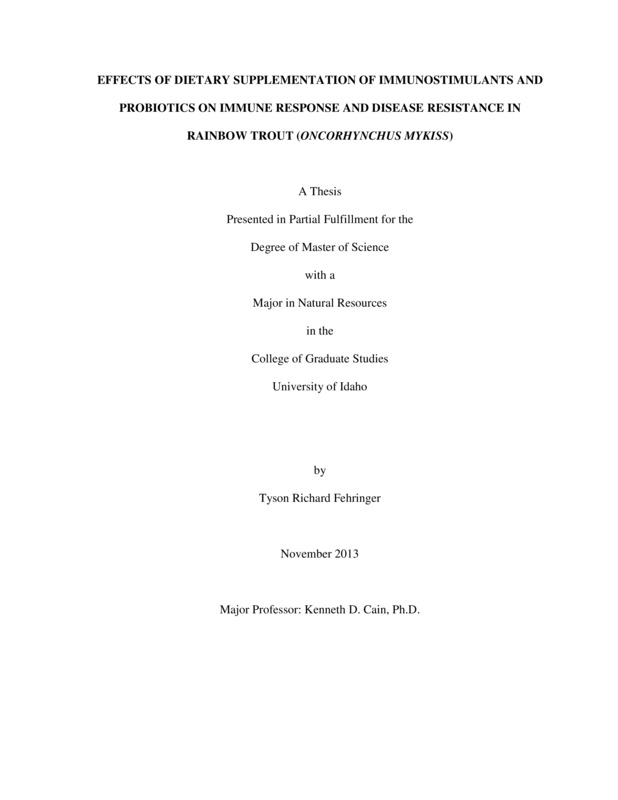Effects of dietary supplementation of immunostimulants and probiotics on immune response and disease resistance in rainbow trout (Oncorhynchus mykiss)
Fehringer, Tyson. (2013). Effects of dietary supplementation of immunostimulants and probiotics on immune response and disease resistance in rainbow trout (Oncorhynchus mykiss). Theses and Dissertations Collection, University of Idaho Library Digital Collections. https://www.lib.uidaho.edu/digital/etd/items/fehringer_idaho_0089m_10076.html
- Title:
- Effects of dietary supplementation of immunostimulants and probiotics on immune response and disease resistance in rainbow trout (Oncorhynchus mykiss)
- Author:
- Fehringer, Tyson
- Date:
- 2013
- Program:
- Natural Resources
- Subject Category:
- Fisheries and aquatic sciences
- Abstract:
-
Flavobacterium psychrophilum is the etiological agent of bacterial coldwater disease (BCWD) and rainbow trout fry syndrome (RTFS). Current prevention strategies are limited and disease treatment primarily relies on antibiotics. As concerns about antibiotic use increase so too does the search for alternative treatment and prevention methods.
In this study, testes meal from pink salmon, Oncorhynchus gorbuscha, testes collected from Alaskan seafood processing byproducts was supplemented in diets to determine effects on growth and immune function of rainbow trout, Oncorhynchus mykiss. Three diets were formulated for this study: a diet containing 5% testes meal, a diet containing a â-glucan immunostimulant (Macrogard) and a control diet. Each diet was fed to triplicate groups of juvenile rainbow trout for 12 weeks, at which time they were challenged with F. psychrophilum. No significant differences in growth were observed. Intermittent increases in phagocytic activity were observed in fish fed the testes meal. At 12 weeks; however, the phagocytic activity was significantly lower in fish fed the testes meal and Macrogard diets. Fish fed the testes meal and Macrogard diets also had significantly lower (P < 0.05) antibody titers at 8 weeks post challenge. These findings suggest suppression of the innate immune response following long term application impaired the adaptive immune response.
To further investigate potential feed additive benefits, this study also examined the long term use of the probiotics Enterobacter sp.strains C6-6 and C6-8 in combination with an attenuated F. psychrophilum vaccine. In the first challenge, rainbow trout fry were fed a diet top-coated with C6-6, C6-8 or a combination of the two from first feeding and challenged at 54 days post hatch with a virulent strain of F. psychrophilum. Following challenge there were no significant differences in the cumulative percent morality (CPM) between any of the treatments, suggesting long term feeding of these probiotic strains may have limited benefits. For the second challenge, fish fed the same probiotic treatments as above were vaccinated with a live attenuated F. psychrophilum vaccine by 90 second immersion and subsequently challenged with virulent F. psychrophilum. In the second challenge, relative percent survival values were lower than expected, potentially due to high mortality in the challenge. However, fish fed C6-6 prior to vaccination had significantly lower mortality following challenge. This suggests that feeding with this probiotic strain prior to vaccination may be beneficial. The reason for this enhanced efficacy is not clear, but this could represent a more focused management strategy for BCWD.
In an attempt to gain a baseline understanding of the potential mechanisms of protection of C6-6, a final study was conducted to determine if injection of the bacteria into rainbow trout reduced mortality and resulted in cross-protection due to F. psychrophilum infections out to 28 days. Fry received an intraperitoneal injection of phosphate buffered saline (negative control), supernatant from a C6-6 culture, formalin killed C6-6 or live C6-6 and were subsequently challenged with F. psychrophilum 7 days and 28 days post injection. In the challenge occurring 7 days post injection, mortality was significantly reduced (P < 0.05) in fish injected formalin killed and live C6-6 compared to the negative control. In the challenge 28 days post injection high variability within treatments was observed and as a result there was no significant reduction in mortality. Interestingly, at both time points significant reduction in mortality rate was observed in all treatments following log rank survival curve analysis when compared to the negative controls. At 28 days post injection, fish receiving formalin killed and live C6-6 also had significantly increased cross-reactive antibodies to F. psychrophilum. This was unexpected, but indicates that both innate and adaptive responses are stimulated by Enterobacter sp. C6-6, and that benefits observed following use of this probiotic are in part linked to immune enhancement.
- Description:
- masters, M.S., Natural Resources -- University of Idaho - College of Graduate Studies, 2013
- Major Professor:
- Cain, Kenneth D
- Committee:
- Hardy, Ronald W; Moffitt, Christine M
- Defense Date:
- 2013
- Identifier:
- Fehringer_idaho_0089M_10076
- Type:
- Text
- Format Original:
- Format:
- application/pdf
- Rights:
- In Copyright - Educational Use Permitted. For more information, please contact University of Idaho Library Special Collections and Archives Department at libspec@uidaho.edu.
- Standardized Rights:
- http://rightsstatements.org/vocab/InC-EDU/1.0/

